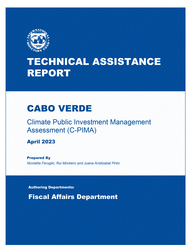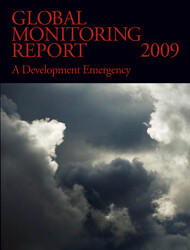
Cabo Verde: Technical Assistance Report-Climate Public Investment Management Assessment (C-PIMA)
Cabo Verde: Technical Assistance Report-Climate Public Investment Management Assessment (C-PIMA)
READ MORE...
Volume/Issue:
Volume 2024
Issue 034
Publication date:
ISBN:
Add to Cart by clicking price of the language and format you'd like to purchase
Available Languages and Formats
Topics covered in this book
This title contains information about the following subjects.
Click on a subject if you would like to see other titles with the same subjects.
Money and Monetary Policy , Public Finance , International - Economics , Environmental Economics , Natural Disasters , Cabo Verde , Climate change , public investment management , capital spending , climate- related public sector planning and coordination , climate sensitive infrastructure , , Cabo Verde port authority , IMF's Fiscal Affairs Department , I , climate change in Cabo verde , climate change Pima framework , Cabo Verde infrastructure , Natural disasters , Public investment spending , Climate finance , Global
Summary
This technical report discusses the findings and recommendations of the Climate Public Investment Management Assessment (PIMA) of Cabo Verde (CPV) undertaken in March 2023.
Progress has been made in the development of a comprehensive climate change policy framework, spatial planning, coordination with municipalities and in planning for disaster risk financing. But coordination across the central government is weak with no institution positioned strategically to lead either adaptation or mitigation related investments. The regulatory and oversight framework for public enterprise (PEs) does not promote consistency between their climate-related investments and national climate policies while PEs are the main driver of public investment in Cabo Verde. The Public-Private Partnership (PPP) framework does not define how climate risks are allocated between the government and PPP partners, while the use of PPP is increasing. Investment project appraisal and selection practices do not exist. Climate-responsive spending in infrastructure is at a concept development stage but gender budgeting is a well-recognised practice. Ex post reviews or external audits of projects on climate outcomes are not conducted and climate impact is not integrated into public asset management. On these grounds, this report makes seven high-priority recommendations which could improve climate-related public investment management in Cabo Verde and support green and sustainable economic growth.
In addition, the C-PIMA report informed the design of the reform measures for a recently approved Arrangement Under the Resilience and Sustainability Facility.
Copyright © 2010 - 2026
Powered by:
AIDC



